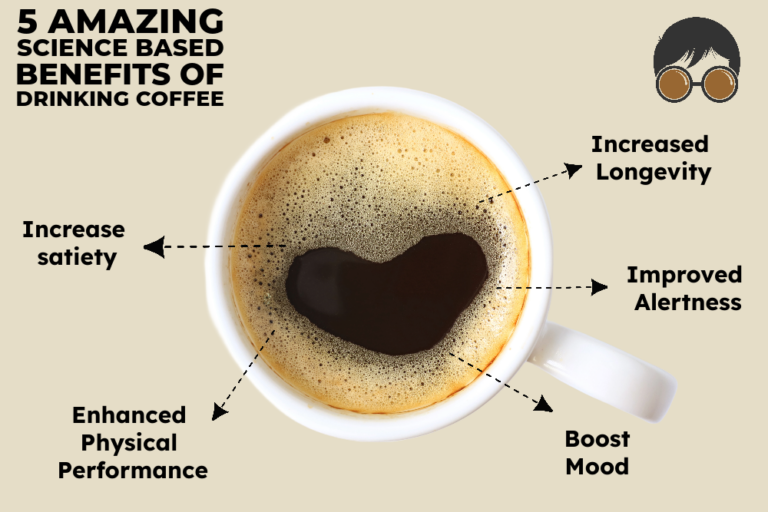The Power of Coffee:
5 Amazing Health and Wellness Benefits
Five Amazing Science-based Benefits of Drinking Coffee
Coffee is a highly beneficial drink with many health advantages. Despite the variety of functional beverages available, coffee is the OG in this category, and for good reason. There are numerous benefits, but here are my five favorite scientifically backed benefits of coffee.
1. Increased Longevity
Drinking coffee regularly can help you live longer and healthier. The European Journal of Epidemiology published a study revealing that coffee drinkers had a lower risk of death from cardiovascular disease, certain types of cancer, and all-cause mortality. Coffee’s caffeine suppresses inflammation-related genes, and it is a significant source of antioxidants that can neutralize harmful free radicals in the body, potentially reducing the risk of certain diseases.
2. Improved Alertness
A study featured in the Journal of Psychopharmacology uncovered that drinking one large coffee a day (200 mg of caffeine) or four smaller cups of coffee in a day (65 mg of caffeine each) improved tasks involving deep concentration, alertness, and enhanced performance on cognitive vigilance tasks.
3. Improved Mood
Coffee stimulates the release of neurotransmitters like dopamine and serotonin, which can enhance mood and reduce the risk of depression. A meta-analysis of seven studies found that each cup of coffee consumed per day was linked to an 8% lower risk of depression.
4. Enhanced Physical Performance
Caffeine increases adrenaline levels, potentially improving physical performance by breaking down body fat and releasing it into the bloodstream as energy.
5. Increase satiety
Coffee is clinically proven to support our satiety hormones. There are many studies supporting the effects of satiety on coffee drinkers. A study published in the American Journal of Clinical Nutrition revealed that coffee can stimulate the release of a satiety hormone called CCK. According to another research published in the journal Physiology & Behavior, optimizing levels of CCK could play a key role in reducing levels of body fat.

If you like coffee but experience unwanted side effects such as jitters, acid reflux, or excessive energy, there are ways to minimize them. Here are five tips to help you enjoy your coffee without these side effects:
1. Fresh Coffee
Exposing freshly roasted coffee beans to water and air can expedite deterioration. Therefore, coffee beans that have been in storage for months since leaving the roaster will likely lose a substantial portion of their essential health benefits, flavors, and personality by the time it is brewed.
2. Caffeine intake
Coffee contains a mix of nutrients like proteins, polyphenols, flavonoids, and, last but not least, caffeine. While caffeine is the main functional ingredient in coffee, its effects are tied to the other naturally occurring compounds that make up the brewed cup. Nature knows best and has perfected dosing caffeine for us with coffee. The Journal of Clinical Sleep Medicine recommends refraining from substantial caffeine use for at least 6 hours before bedtime for best sleep hygiene.
3. Acidity
Choose a darker roast and brew it longer. A French press can make this easy for you. You can also try our cold brew coffee recipe, which can be enjoyed warm. The flavor is incredibly smooth and creamy! To brew a low-acid cup of coffee, use coarser grinds.
4. Heartburn
Combining coffee with high-quality fats, such as avocado and eggs, can help counteract heartburn. These alkaline pairings can help lower acidity in coffee and improve our overall satiety.
5. Jitters
CBD Coffee can help reduce involuntary muscle contractions and feelings of nervousness and anxiety due to its anti-anxiety and anti-inflammatory effects. Anecdotally, many High Level CBD Coffee members have reported feeling focused for longer periods of time.
Coffee has remarkable benefits, and we should ensure its quality is recognized. We can use it to improve our health and well-being.
Share if you enjoy this post!
References
- Kim Y, Je Y, Giovannucci E. Coffee consumption and all-cause and cause-specific mortality: a meta-analysis by potential modifiers. Eur J Epidemiol. 2019 Aug;34(8):731-752. doi: 10.1007/s10654-019-00524-3. Epub 2019 May 4. PMID: 31055709.
- Kamimori GH, McLellan TM, Tate CM, Voss DM, Niro P, Lieberman HR. Caffeine improves reaction time, vigilance and logical reasoning during extended periods with restricted opportunities for sleep. Psychopharmacology (Berl). 2015 Jun;232(12):2031-42. doi: 10.1007/s00213-014-3834-5. Epub 2014 Dec 21. PMID: 25527035; PMCID: PMC4432086.
- Alasmari, F. (2020). Caffeine induces neurobehavioral effects through modulating neurotransmitters. Saudi Pharmaceutical Journal : SPJ, 28(4), 445-451. https://doi.org/10.1016/j.jsps.2020.02.005
- Wang L, Shen X, Wu Y, Zhang D. Coffee and caffeine consumption and depression: A meta-analysis of observational studies. Aust N Z J Psychiatry. 2016 Mar;50(3):228-42. doi: 10.1177/0004867415603131. Epub 2015 Sep 2. PMID: 26339067.
- Douglas BR, Jansen JB, Tham RT, Lamers CB. Coffee stimulation of cholecystokinin release and gallbladder contraction in humans. Am J Clin Nutr. 1990 Sep;52(3):553-6. doi: 10.1093/ajcn/52.3.553. PMID: 2393014.
